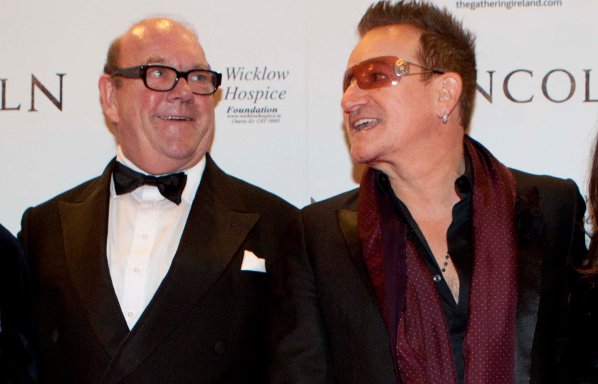IN SOME ways, it was expected; in many others, it wasn't.
You may have assumed that Paul McGuinness would continue as U2's manager until either he or they had shuffled off this mortal coil – but his decision to step down after 35 years at the helm of the proverbial 'good ship U2' perhaps makes sense in more personal than professional ways.
After all, now 62, McGuinness has spent over half of his life steering the Dublin quartet to global superstardom, becoming as synonymous with U2 as Colonel Tom Parker was with Elvis, and Brian Epstein was with the Beatles.
Even Van Morrison once said "I think Paul McGuinness and U2 created the Irish music industry. It certainly wasn't there before it."
While that's not exactly the case, there's no doubt that McGuinness played a pivotal role in Bono and co's fortunes.
Born in Rinteln, Germany in 1951 to a Liverpudlian father serving with the RAF and a mother hailing from Co. Kerry, Paul was one of three children in the McGuinness family.
He studied at the prestigious Clongowes Wood boarding school in Kildare, before progressing to Dublin's Trinity College, where he was involved in arts productions and the college magazine, and where he also met his future wife Kathy Gilfillan, whom he married in 1977.
A year later, while managing folk-rock group Spud, he was introduced to a fledgling U2 by Hot Press journalist and old college friend Bill Graham.
Recalling the first time that he saw the band play at Dublin's Project Arts Centre, he said: "The Edge's playing was quite unique; Bono stared into the audience's eyes as if daring them to look back at him. It looked to me like they could be a great rock band."
 Paul McGuinness has managed U2 for 34 years
Paul McGuinness has managed U2 for 34 years
His hunch proved correct and within a few years, U2 were on their way to world domination – despite, as the story goes, his charges' reluctance to continue down the rock 'n' roll path after Bono, The Edge and Larry Mullen were concerned that the rock 'n' roll lifestyle clashed with their Christian ethics.
McGuinness founded Principle Management in 1984 and in the same year, scored a canny deal for the band with Island Records, who could not afford to pay U2's residual royalties on The Joshua Tree album.
A renegotiation of their contract gave them an estimated 10 per cent stake in the label as a settlement – and ultimately, more muscle for their careers going forward.
The fact that U2 split their earnings equally with McGuinness instead of paying him a percentage fee, as is usually the case, is testament to his unofficial title as the band's 'fifth member'.
Yet the implicit trust that they place in his shrewd business decisions has made for some unfavourable press, too; most notably in 2006, when he advised the band to move its publishing assets to the Netherlands after a cap was placed on artists' tax exemption in Ireland.
No doubt it has saved U2 millions, but it remains an ongoing bone of contention in the country they continue to reside in.
Other business decisions related to the band have proved more fruitful and less controversial: sponsorship deals with BlackBerry, Apple's U2-branded iPods and hosting the first-ever live gig on YouTube, among them.
It is arguably his willingness to develop 'U2: The Brand' that has kept the band afloat as the bottom fell out of the music scene with the Internet's advent.
Understandably, he has plenty to say about downloading culture, too, taking potshots at companies such as Apple, Google and Facebook during last year's MIDEM music conference.
"I don't want to engage in Google-bashing, but there is a sense of unease across Europe, across the world about Google," he said.
 Paul McGuinness and Bono
Paul McGuinness and Bono"Google have been making encouraging noises about restricting illegal sites or directions to illegal sites for acquiring music. The noises are very encouraging, but I’d like to see some action."
Like any good businessman, however, McGuinness remained aware of the pitfalls of putting all your eggs in one basket, despite U2's global success.
Over the years, his business acumen has led to investments and acquirements in Phantom FM, Ardmore Studios and – somewhat bizarrely – the Quasar laser gun game, while he was a founding partner of Irish station TV3.
He has managed other acts over the years, too, from a brief dalliance with Sinead O'Connor to Chrissie Hynde of The Pretenders, and more recently, PJ Harvey, US band The Rapture and Irish singer-songwriter Paddy Casey.
When all is said and done, however, it is his partnership with U2 that McGuinness will be most famously remembered for.
Handing over the reins to Live Nation, the titan promoters who been looking after U2's merchandise, worldwide touring and website since 2008, is yet another canny move on McGuinness's part.
As Live Nation have also acquired Maverick, it means that U2 will now be taken under the wing of Madonna's manager Guy Oseary – a capable pair of hands, if ever there was one.
"It could be seen as slightly poor etiquette for a manager to consider retiring before his artist has split, quit or died, but U2 have never subscribed to the rock ‘n’ roll code of conduct,” he told the New York Times.
"As I approach the musically relevant age of 64, I have resolved to take a less hands-on role, as the band embarks on the next cycle of their extraordinary career."
With the band's 13th studio album set for release next spring, it's the ideal time for one of music's most successful figures to make another shrewd decision and bow out gracefully.

